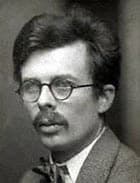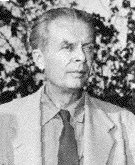Aldous Huxley
Critique • Works • Views and quotes

Born
1894
Died
1963
Publications
Novels, travel writing, poetry, plays, philosophy
Writing language
English
Writing place
English
Literature
• Point Counter Point (1928)
• Brave New World (1932)
• Eyeless in Gaza (1936)
Novels
• Point Counter Point (1928)
• Brave New World (1932)
• Eyeless in Gaza (1936)
British Literature
• Point Counter Point (1928)
• Brave New World (1932)
• Eyeless in Gaza (1936)
Historical Fiction
• Brave New World (1932)
Science Fiction
• Brave New World (1932)
The old-school ideas man and the new age
Most articles on Aldous Huxley start by noting his famous family: grandfather T.H. Huxley, the scientist and supporter of Darwin's evolution theory; father Leonard Huxley, the literary editor; great-uncle Matthew Arnold, the great poet and cultural critic; and brother Julian Huxley, the prominent biologist. His main personal claim to fame is always listed as the science fiction novel Brave New World. (The game Trivial Pursuit even has an answer that mistakenly attributes the origin of the phrase "brave new world" to him.)
But in the first half of the twentieth century Aldous Huxley was considered one of the great intellects of the era, as he produced a wide range of novels, histories, poems, plays, travel books, and essays on philosophy, arts, religion and psychology. Then the second half of the century, especially the 1960s, saw a resurgence of interest in Huxley's later works on mysticism, drugs, sex and utopianism.
Today his early literary novels are still studied, though not read by the intelligent general public as they once were. In some ways this is too bad, as the concerns that his "novels of ideas" raised are still with us. However, his characters' statement of those ideas is somewhat dated and their aristocratic and artistic milieus are difficult to identify with today. If you can get past that though, you may find his best novels quite provocative—not to mention, viciously funny in places.
Huxley came from a well-to-do background himself and was educated at Eton and Oxford. After the First World War (he was kept out of the fighting by near-blindness), he wrote for a literary publication, while publishing poetry and stories. His first novel was Crome Yellow (1921), which wittily satirized the intellectual pretensions of his upper-crust friends—although he denied this, saying the characters in the novel were just stick figures created to present ideas.
His next novel was Antic Hay (1923), my personal favourite, which parodied the bohemian community in post-war London—while creating a couple of ridiculously tragic characters who have stayed in the memory for years. Whenever I run across a self-important artist I think of the hopelessly deluded Casimir Lypiatt.
Point Counter Point (1928) is held to be Huxley's greatest literary production, and it does present some more wicked parodies of contemporary intellectuals—his friends the novelist D.H. Lawrence and the critic Middleton Murry—as well as create some lost figures in touching situations. But the characters' ideas are played off against against each other at much wordier length than in Crome Yellow and the tone is more cynical.
Passing pacifism and rebirth
Brave New World (1932) is the novel that has most connected with the public, having been cited with George Orwell's Nineteen Eighty-Four (with which it is frequently confused), as one of the two great works of the century depicting a future in which science and technology repress the human spirit.
In his writing to this point, Huxley had been increasingly concerned with the loss of spirituality in a scientific age, and his last great novel, Eyeless in Gaza (1936), brought this to the fore. In this complicated, chronology-switching, semi-autobiographical work, the characters go through personal and political phases leading to dead-ends before the main character finds his own salvation in mystical pacifism—an idea that soon seemed to pass into irrelevance with the start of the Second World War, although it had a rebirth later.
 After this, Huxley's writing drew less attention, although there are numerous fans of his
nonfictional works: The Devils of Loudun (1952), a study in sexual
hysteria; The Doors of Perception (1954); and Heaven and Hell (1956). The latter
two describe his experiments with hallucinogenic drugs, as well as
inspired the name of the the Doors rock group.
After this, Huxley's writing drew less attention, although there are numerous fans of his
nonfictional works: The Devils of Loudun (1952), a study in sexual
hysteria; The Doors of Perception (1954); and Heaven and Hell (1956). The latter
two describe his experiments with hallucinogenic drugs, as well as
inspired the name of the the Doors rock group.
Brave New World Revisited (1959) was a nonfiction sequel to his most popular novel and brought his dystopia into the nuclear era. Island (1962), on the other hand, was his attempt to put forward a utopian alternative, although he ended by accepting it was impractical.
One other thing Aldous Huxley is famous for: asking for and taking LSD as he lay dying—a seeker to the end.
And he's still a provocative read, whether you agree with him or not. Huxley presents so many ideas, and ideas about ideas, that I imagine almost any reader would both agree with him in parts and find him dangerously misguided in other parts. (I know I do.)
Which, in my books, makes him required reading for everyone.
— Eric
Critique • Works • VEWS AND QUOTES

